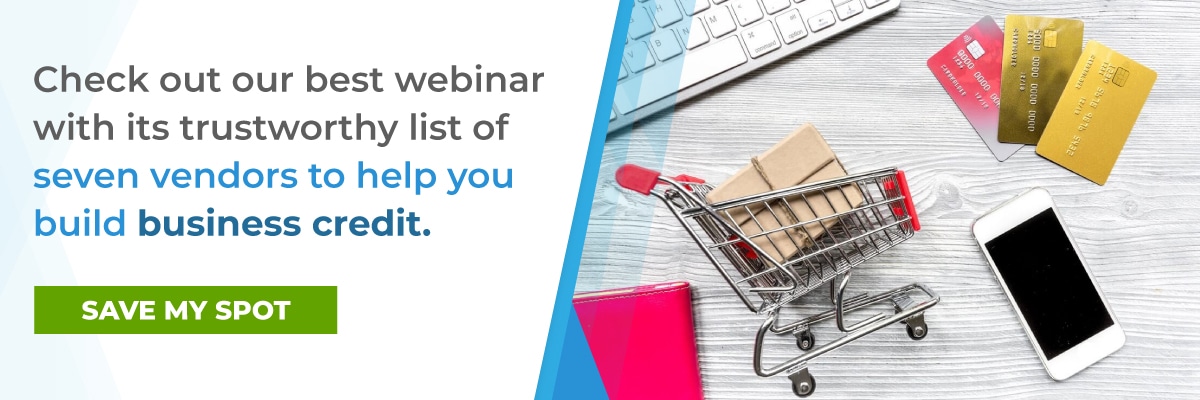- Connect With Us!
- (877) 600-2487
- info@creditsuite.com
Small Business Crowdfunding: Is it For You?
Published By Faith Stewart at May 1st, 2020
Small business crowdfunding is just one of many funding options. How do you know which one is best for you? Crowdfunding is an innovative way for a business to get funding. Honestly, it seems to be perfect. Except, it doesn’t work for everyone
Small Business Crowdfunding is Not for Everyone
The problem is, a huge number of crowdfunding campaigns are not successful. That doesn’t mean you won’t see success, but crowdfunding for startups really isn’t for everyone. It works much better for some types of businesses than others.
In addition, how you run your campaign makes a huge difference in your success. We have the secrets to both successful campaigns and which businesses do best with small business crowdfunding.
Check out our best webinar with its trustworthy list of seven vendors to help you build business credit.
What is Small Business Crowdfunding
 Crowdfunding sites let you get the word out about your business to thousands of micro investors at once. Anyone interested can invest as much or as little as they want.
Crowdfunding sites let you get the word out about your business to thousands of micro investors at once. Anyone interested can invest as much or as little as they want.
They can pledge a wide range of amounts depending on the campaign and the platform in use. They may give anywhere from $50 to $500. Heck, pledges can even go as low as $5.
Most offer rewards to investors for their giving. Usually, this is the product the business will be selling. However, often different levels of giving result in different rewards. For example, a $5 gift may get you a thank you note, and a $100 gift will get you an early release of the product.
What Types of Businesses Do Best with Small Business Crowdfunding?
Any business can give crowdfunding a shot, and success is always possible. However, historically these types of businesses have done best.
New Local Services
This one was surprising to me personally, but it makes sense. If you want to open a local business, especially in an area where there is a direct need, it could do well with small business crowdfunding for startups. It may depend on your platform, more on that later. For now, Local Lift is designed specifically for local businesses to request funding, gauge interest, and even build a customer base before opening.
New High-Tech Gadgets
This doesn’t mean just a new take on what is already out there. Rather, this is something that is completely unique. That is what is going to get the most support. Also, it needs to have a working prototype and there needs to be research behind it.
Unique Inventions for the Home
This category gets a ton of support, especially for items that solve everyday problems. For example, the fly killing salt shotgun and the wet diaper sensor have done really well!
New Tools for Cooking at Home
Think things that will let you do something at home that you normally can’t, like carbonate your own soda, or something that lets your cook things faster, or easier. Items that serve multiple purposes are another option. Maybe an easy way to make sushi at home? New kitchen tools for the home are often a big hit.
Small Business Crowdfunding Platforms
Suppose you have one of these highly successful ideas, or even if you do not and you want to give small business crowdfunding a shot anyway, you need to find the right platform. Now more than ever, with the economic downturn due to coronavirus, you have to choose your platform carefully. Here are a few to start with.
Kickckstarter
With over 14 million backers, Kickstarter is one of the largest crowdfunding platforms in the world. They boast over 130,000 funded projects. These include products and services related to:
- Publishing
- The arts and film
- Comics and illustration
- Design and tech
Kickstarter requires you to have a prototype. In addition, projects cannot be for charity. However, nonprofits can use Kickstarter. Also, you are not allowed to offer equity in a company as a perk.
Other banned projects and perks include anything to do with:
- Contests and raffles
- Cures and medicines
- Credit services
- Live animals
- Alcohol
- Weapons
Creators collect a 5% fee on all funds. They also use a payment processor, Stripe, that applies payment processing fees (roughly 3-5%). Unsuccessful campaigns do not pay a fee. There are also fees of 3% + $0.20 per pledge. Pledges under $10 have to pay a discounted micro pledge fee of 5% + $0.05 per pledge.
Indiegogo
Indiegogo has over 9 million investors. They do not allow campaign goals below $500. Also, they charge 5% platform fees and 3% + 30¢ third-party credit card fees. Note that fees are deducted from the amount raised, not the goal. As a result, if you raise more than your goal, you will pay more in fees. They do not accept PayPal.
Indiegogo is noteworthy because they offer flexible financing in addition to fixed financing options. So, if you do not make your goal and you chose flexible funding, you can at least hold onto what you collected. This is the opposite of how crowdfunding normally works.
RocketHub
RocketHub is better suited for those who need venture capital. They give you an ELEQUITY Funding Room. There, you can pitch your idea and see if it stimulates any interest from donors.
This platform is specifically for business owners working on projects related to:
- Art
- Business
- Science
- Social
If you achieve your fundraising goal, you will pay a fee of 4%. In addition, you’ll pay a 4% credit card handling fee. But if you do not reach your goal, then that fee jumps up to 8% plus the credit card handling fee. That means RocketHub is best for companies that are more confident they will make their goals.
Check out our best webinar with its trustworthy list of seven vendors to help you build business credit.
CircleUp
CircleUp aims to help up and coming brands and companies raise capital for growth projects. However, companies must apply and show revenue of at least $1 million to get a listing on the site. That said, the platform will sometimes make exceptions.
CircleUp can be good for those who already have a somewhat established business. That includes business owners who want both funding and guidance in order to take their businesses to the next level.
If your business gets approval for listing on CircleUp, the fee percentage comes from the total amount you raise.
GoGetFunding
GoGetFunding has been around since 2011. They let fundraisers keep the money they raise, regardless of whether they meet their target. If your business idea is unproven and you are unsure of whether you can meet your funding needs with a crowdfunding for business campaign, flexible funding can be a great option.
They charge a 6.9% fee. This is pretty high, but it includes both the platform fee and the payment processing fee. Therefore, it is actually more cost-effective than many other crowdfunding for business options.
Crowdfunder
With Crowdfunder, investors purchase equity in promising companies. They consider campaigns to be deals, and its donors are investors. Basic listings are $449/month. Self-start listings are $499/month. Self-start plus is $999/month. In their community, there are over 15,000 investors and 200,000 startups.
Fundable
This is a crowdfunding for business platform that allows companies to raise funds from investors, customers, and friends. They have over $80 million in funding commitments.
Fundable does allow equity campaigns. Also, they charge $179 per month to raise funds. Fees on rewards are: 3.5% + 30¢ per transaction. They do not charge success fees.
Fundly
Fundly allows for crowdfunding for creative ventures. If your business has a creative lean, this might work for you.
There is no minimum amount to fundraise or to keep money you raise. You can usually withdraw payments within 24 – 48 hours of the donation. In addition, they offer automatic transfers. It is free to create and share an online fundraising campaign.
Yet, Fundly will deduct a 4.9% fee from each donation you get. A credit card processing fee of 3% is also taken out from each donation. Also, there are nonspecific automatic discounts for larger campaigns.
Keys to a Successful Small Business Crowdfunding Campaign
There is no such thing as guaranteed success. These steps can help make sure you give yourself the best chance possible when it comes to crowdfunding for business.
Do the Research
You have to know your market and what demand looks like. The only way to find that out is to research. Figure out how much money you actually need before you set your goal. Lots of business owners have started crowdfunding campaigns only to find the demand isn’t there or their goal fell short of the actual need.
Create a Prototype
Trulty, you have to have a sample to show investors. It’s important. People are generally more likely to let go of money if they can see something tangible. This is so vital that Kickstarter actually mandates that you to have a prototype to show potential investors
Consider Your Platform
Once you know who your target audience is, you can determine if you would be best served by Kickstarter, Indiegogo, or another successful platform that is not as well known. If your audience doesn’t use the platform you are on, it won’t matter how great your idea or product is. They’ll never see it.
Give Awesome Incentives
This is huge. Don’t make promises you can’t keep, and don’t give away the company. Still, if someone one is going to help you get started, they deserve something amazing. Offer more than a thank you note. Be bold with what you offer as a reward for their support, without harming your success.
Set a Goal
Setting goals you can reach is necessary to success. Make certain you look at the numbers in relation to actual facts before you set a fundraising goal. Be certain you have production facilities on the line that can meet the timeline goals. Do not randomly set goals with no clue what it will take to reach them.
Check out our best webinar with its trustworthy list of seven vendors to help you build business credit.
It’s All in the Marketing
You can’t just willy nilly throw a campaign together. If you create a video, it needs to be professionally edited. Any social media should be specifically targeted toward your audience. If they are a cheesy, audience, then that is how your social media and videos need to be. A more sophisticated audience will need a different feel.
Whether Small Business Crowdfunding Works for You or Not, You Need Strong Fundability
What is fundability? It’s the ability of your business to get funding. What affects the fundability of your business? How do you make your business fundable? Those are short questions with very long answers. Here’s a brief rundown.
How Do You Make Your Business Fundable?
Your business will never build fundability if you do not set it up to do so. These means:
- Having a separate phone number, address, and email address for your business. Don’t use your own.
- Incorporating as an S-corp, LLC, or corporation.
- Opening a separate, dedicated business bank account.
- Have all the licenses necessary to operate.
- Getting an EIN from the IRS.
- Getting a D-U-N-S number from Dun & Bradstreet.
- Having a professional, user friendly business website.
That’s just the setup however. This doesn’t cause your business to be fundable, it just gets it ready. If everything else is stellar and your business isn’t set up this way, it will not be fundable.
What Affects the Fundability of Your Business?
This list is much more complicated. All of these things fit together like the pieces of a very strange puzzle. Some of it has to do with the past, some the future, and some deal with what is happening right now. For example, some things related to you personally, such as liens, traffic tickets, and person credit can actually affect the fundability of your business.
That said, if you flood the agencies that report this information with enough positive information, the older information will not matter as much. At the same time, you have to work to actively build business credit, which is a whole other animal. It affects fundability in a huge way, but contrary to personal credit, it doesn’t build on its own.
Is Small Business Crowdfunding for You?
It might be. If you fit into one of those categories known to be the most successful, give it a shot. Even if you don’t, there’s nothing that says you can’t try. Either way, be sure to follow our tips for a successful campaign, and work on fundability at the same time. In the future, you will most definitely need it.

 " class="attachment-blog-single size-blog-single wp-post-image" alt="Get Business Credit Cards for New Businesses Credit Suite-Business Line of Credit Decoded" title="Get Business Credit Cards for New Businesses">>
" class="attachment-blog-single size-blog-single wp-post-image" alt="Get Business Credit Cards for New Businesses Credit Suite-Business Line of Credit Decoded" title="Get Business Credit Cards for New Businesses">>